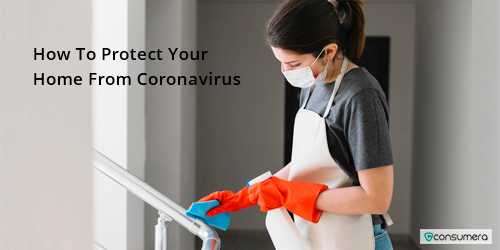With the recent outbreak of the COVID-19 having shaken the world, companies across the U.S have taken to remote work on a large scale. While the Coronavirus is very contagious, there is a lot of misinformation fueling worldwide panic. Therefore it is important to rely only on reputable organizations for information to protect your home from Coronavirus and in turn, your family.
The virus circulates through respiratory droplets released when people cough or sneeze. The World Health Organisation states that common signs of the infection include cough, fever, shortness of breath, etc. If the disease is severe, it can lead to pneumonia, respiratory disorders, and kidney failures.
Therefore, we have listed some simple steps you can follow to reduce the chances of contracting this disease, especially while you work from home.

Homeowners should be careful about devices like their HVAC system. Improperly maintained air conditioners can spread diseases. Not changing the filters regularly or letting in fresh outside air thus recirculating only the stale, old air encourages the breeding of germs that worsen respiratory problems.
The disease spreads by contact with infected surfaces. Your home has many such surfaces like walls, kitchen surfaces, tables, doorknobs, toilets, appliances, and so on. Follow these simple steps to sanitize your home.
Surfaces such as switches, countertops, doorknobs, handles, etc. get dusty quickly. If the surface is contaminated and a member of your household comes in contact, they will get infected. To prevent this, you should wash all these surfaces often with detergent and water. This gets rid of the virus and keeps your family safe.
It’s a good idea to wear disposable gloves while cleaning common household surfaces. Since it’s virus season, use antibacterial disposable wipes while cleaning your home. Sponges and mops may contain several germs if used repeatedly to clean items in your home. But if you are going to reuse cleaning sponges, make sure to dip them in hot water as this kills the germs.
Your phone and other devices such as your Apple Watch travel with you wherever they go, picking up infections on the way. Clean your devices using disinfecting wipes. We seldom clean our phones and other wearables turning them into breeding grounds for viruses and dangerous bacteria. Don’t forget to clean the other electronics in your home like your television, washing machine, dishwasher, etc.
Bathrooms are another place where you can easily catch infections. It should be a high priority cleaning zone this season. Make sure to clean all the surfaces in your bathroom wearing a pair of gloves with disinfectant.
Your toothbrush can also contain a lot of bacteria and spread infections. Every family member’s brush should be kept apart. The face towels in your bathroom should be washed very frequently, and every member must have a separate towel.
If anyone in your family is sick or has symptoms of the disease the person should be separated. They should avoid contact with anyone in the house, and should only leave the house when visiting a doctor. The caregiver should also take necessary precautions and wipe their hands with a sanitizer before treating the ill.
Prevention is better than cure. These home maintenance habits should become a part of your routine in the times to come. If you have contracted a respiratory illness, make sure to only go to work once you are completely fit. Help your family members and co-workers to prepare themselves and their homes. Contact your nearest health care practitioner if you develop any symptoms.
Our top 3 picks



